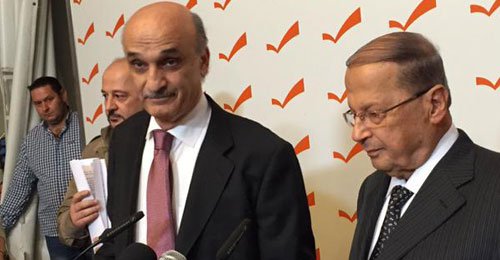 Lebanese Forces leader Samir Geagea announced after his highly anticipated meeting with Free Patriotic Movement leader Michel Aoun on Tuesday that he wished the meeting took place 30 years ago , adding “better late than never”
Lebanese Forces leader Samir Geagea announced after his highly anticipated meeting with Free Patriotic Movement leader Michel Aoun on Tuesday that he wished the meeting took place 30 years ago , adding “better late than never”
“The main reason for this meeting is the joining of two large political forces,” Geagea said from Aoun’s Rabieh residence. “And in the case that these forces join [together], then they could have a positive effect on developments in Lebanon.”
The event signaled a thaw in the bitter rivalry that has plagued ties between the rival groups, following a rare meeting that saw the announcement of a highly-anticipated declaration of intent.
Geagea said, is not the end of dialogue but the start of a new relationship between the two rival parties.
“We were not happy with the [recent] stage in our relationship, and we needed to exit this point [in order] to move on to a better stage,” he said. “Some people think that this meeting is the end of our dialogue, but honestly this is only the start.”
The LF chief said that the past six month of preparatory talks set the ground-work for improving almost 30 years of thorny relations between the two groups, noting that today the relationship will “start at zero and the real work will begin from here onwards.”
“We are going to exercise our full efforts so this attempt doesn’t fail,” he said. “Issues that we agree on will be good and any differences we have will be put aside for a later stage.”
He said the declaration of intent wasn’t easy to reach but noted that it reflects the positive dynamic that is starting to exist between the two parties.
The LF chief concluded by saying that “he hoped this new start will never end.”
Aoun also spoke briefly after the meeting, saying that Geagea’s surprise visit crowned a phase that some people say has taken too long to reach.
He said that dialogue between the rival parties was a gift to Christians and asserted that the Lebanese population “will see more and more from now on.”
When asked about whether the fate of the Lebanese presidency was to be determined by regional powers like Saudi Arabia or Iran, Aoun said that “in the end the decision is ours.”
A meeting between the two party leaders was seen as possible crucial step to ending the country’s year-long presidential impasse.
Both Aoun and Geagea are candidates, but neither has been able to garner enough parliamentary support to win.
Though it may reduce tensions, the declaration is unlikely to change the political alignment of either the FPM or the LF.
Geagea’s presidential candidacy is backed by the March 14 coalition, while Aoun’s is supported by the March 8 alliance.
The two parties also disagree over the legitimacy of Hezbollah’s arms and have diverging stances on the ongoing conflict in neighboring Syria, among other issues.
Declaration of intent
Both parties call for “the election of a strong president who is embraced by his (Christian) community and capable of reassuring the other components of the country,” says the declaration, which was recited by MP Ibrahim Kanaan of the FPM and LF media officer Melhem Riachi.
“Both parties agree to strengthen state institutions and resort to the law to resolve any sudden dispute. They agree not to resort to arms or violence and to support the army because it is the institution that can preserve sovereignty and national security,” the declaration of intent says.
Both parties stressed “commitment to the approach of dialogue” and underlined “their faith in Lebanon, the coexistence formula and the Constitution.”
“They agree to endorse the principles of sovereignty in tackling the regional issues,” the declaration reads.
The LF and the FPM emphasized their commitment to “the Document of National Accord that was endorsed in (the Saudi city of) Taef,” calling for “avoiding anything that would manipulate the stipulations of the Constitution.”
Both parties called for an electoral law that respects equal power-sharing between Muslims and Christians and “restores balance” in state institutions.
They also stressed the importance of “the implementation of administrative decentralization.”
“We underscore commitment to the founding principles of the Lebanese entity and we will exert joint efforts to approve the laws on the property ownership of foreigners and renaturalization” of Lebanese emigrants, the LF and the FPM say in the document.
On the financial level, the two parties called for “abiding by the stipulations of the general audit law that governs state budgets.”
Addressing the issue of foreign policy, the LF and the FPM stressed the need to “endorse an independent foreign policy while building honest ties with all countries.”
“Israel is an enemy and we reject naturalization (of Palestinian refugees in Lebanon) and call for a two-state solution” to the Palestinian-Israeli conflict, the declaration of intent says.
Addressing the Syrian crisis issue and its impact on Lebanon, both parties said they will not allow “the creation of a buffer zone in Lebanon or the use of the Lebanese border for the smuggling of militants.”
“We call for finding a solution to the Syrian refugee crisis, which is a time bomb at all levels and we call for securing their return to safe areas in Syria,” they added.
“We respect all the resolutions of international legitimacy and abide by the charters of the U.N. and the Arab League,” the declaration of intent reads.

Leave a Reply
You must be logged in to post a comment.